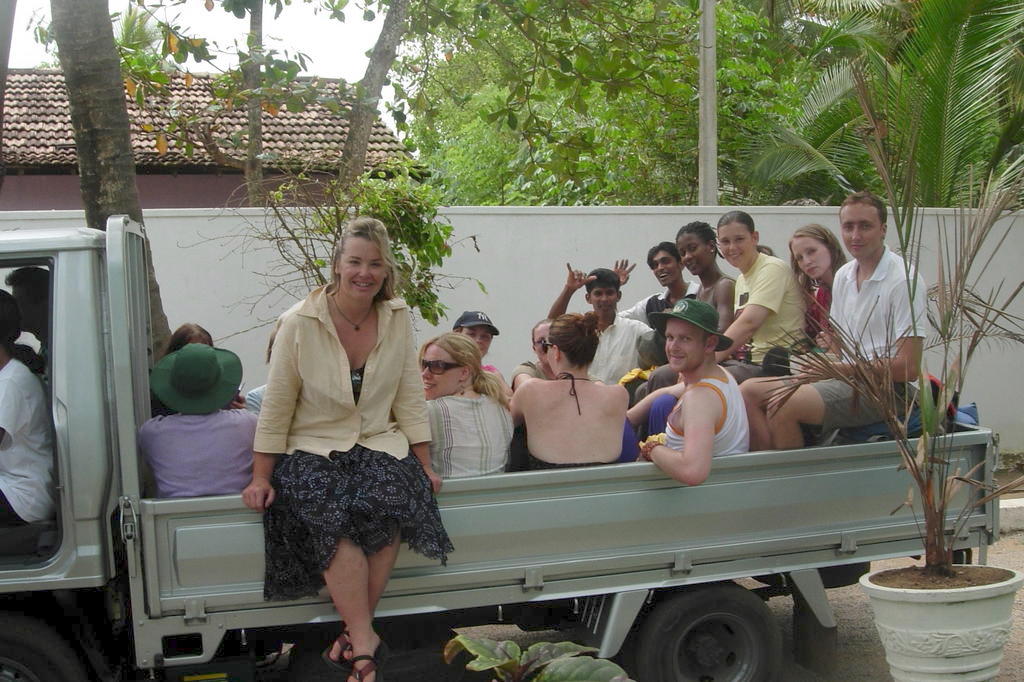Last Day Out
I'm up in Negumbo now, north of Colombo and about a half hour from the airport. We rode up yesterday afternoon in the lorry (that's British-speak for an open back truck). That was adventure! You can't imaging the looks of wonder and stares that followed us every honk of the way -- about a dozen obvious westerners crammed in the back of the truck with luggage. As someone said, now we know how the migrant workers feel.
This last week has been hotter, and harder, but still very good. We have been painting signs, nailing together frames to put around saplings, planting palm saplings at the edge of the beach and erecting those frames surrounded with chicken wire to prevent the goats from eating them, plus the standard beach cleanup, visiting camps and doing activities at the community center. It has been a great trip, and I think in our little way we have made a difference. Finally, in the last few days, we had some locals helping us to clean the beach, plant trees, nail frames, etc. I think that is an indication that the group has finally been accepted, at least a bit, by the local community. When we first got there there wasn't any interaction and apparently there has been a lot of resentment. But now they are starting to see things get a little bit better, cleaner beaches, new trees, activities for their children. It's not dramatic but seems to slowly be taking root - the beginnings of what could be a great partnership. Still I think there is a lot of 'us' and 'them', but hopefully in time it will get better. Hopefully they will understand what the team is trying to accomplish, that it is for them, and hopefully the team can be more aware of what it is that the locals want/need. But right now it seems that assumptions are made on both sides which leads to less progress that potentially could be achieved.
The Sri Lankan people are wonderful, though - all the children are so happy to say hello, very eager to learn, just a very happy people. Considering all that has happened with the tsunami, it is amazing they are starting to rebuild their lives however they can. But there is a tremendous amount of apathy and depression and even fear that another one will come. The waves destroyed houses about a football field or two in from the edge of the beach, so the depth of devastation is not deep, but it is pervasive. The wall of water was about 7 feet high. On Monday I actually found a wedding photo in the rubble - one corner was mangled but the people were clear. Luckily there was a man standing by, watching us, and when I showed it to him, he indicated that he know who it was so I gave it to him. Think about it, though - it has been 7 months, and this was 20 feet away from where people are living. Western countries would have had that rubble cleared by now. But in Sri Lanka things are different, and that must be respected if not wholly understood.
There were lots of little houses on the beach, many fishermen who now have been moved to camps inland, so they are no longer near the sea. Plus they lost absolutely everything so even if they were by the sea, they couldn't fish without equipment. Some boats have been given, but not enough and not consistently. So there is a big problem with resentment -- if one person gets a gas cooker, or a boat, then everyone feels they should including not only the ones that lost their homes, but the ones whose homes were partially destroyed. It's a catch 22 situation... A different example is the gas cookers - one volunteer bought a whole bunch and distributed them. But they have no gas canisters and no money to but them since the government is not consistently giving them their allocated stipend. Now volunteers are encouraged not to give anything to individuals, only to organizations, in addition to stuff for the community center that will be shared.
It is hard to know how things were before the tsunami, though, since we have no real point of reference. The country's people are devastatingly poor so it is difficult to see what is just the way of life, and what is the aftermath of the tsunami - trash, state of disrepair of buildings, etc.
Many of us feel that things are just starting to happen, and it is a shame that we all have to leave. But some are staying on with the project and others are staying on their own, so at least there will be some continuity.
(*** note - these were my impressions at the time. I wrote to i-to-i to clarify and found that some of my assumptions were incorrect... see below for summary and details in entry from Aug 11 ***)
One thing I think the whole group agrees on is that i-to-i is not the purest of organizations. The country coordinator came on Wed and there was venting to be had, and no explanations given, other than the i-to-i person saying it is i-to-i's fault they don't have sufficient money for the project... but he represents i-to-i, so that doesn't wash with me, or others. All our activities were supposed to be ones that did not require money (beach cleanup, visiting camps, etc). They say up front that they are profit-making, but doing the math leads to a clear indication that they are taking advantage of their ability to find placements, and play on people's desire to help. The lodging was probably $15 a night (including meals) and there is $1000 a month that is used for truck rental. Even factoring in another $4000 for the 3 or 4 people that coordinate, averages say $6,000 per month for 20 volunteers. But each volunteer gives $1000 for 2 weeks ($40,000 for 20 volunteers)... leading to a profit of $34k. That's crazy, especially considering that they need supplies, and having some more money to spend on items would make the volunteers so much more efficient and effective (not enough nails, not enough hammers, etc).
(*** More info gathered after I got home - see entry from Aug 11, 2005 The money paid to i-to-i is allocated in thirds: content: 1/3=administration and training costs; 1/3 recruitment and project development costs; 1/3 in-country support, including donation to Helping Hand foundation. The profit was stated as 'minimal' but no number was given. About the resources, the in-country people running the project told i-to-i they did not want/need additional monies and the lack of tools was due to some of the originally purchased equipment being lost or stolen. The in-country people running the project (not positive who that would be) did not want to replace that equipment.
Long term, i-to-i does expect to introduce a new more permanent project of English teaching, etc when this project winds down at the end of the year, which seems to be their forte. ***)
Anyway, I probably won't go through the organization again -- Earthwatch was much better. That said, I do think it was a wonderful experience, I think we did make a difference in a small but progressive way that others can leverage, and it was totally worth it. It's just that almost all of us feel it could have been so much better with the proper coordination, planning and resource allocation, even factoring in the concept of 'Sri Lankan' time... they need Charlene! And there are roadblocks put in place by the government - for example we couldn't actually take down the rubble of houses because the government hasn't inventoried which houses are total losses and which are repairable. Plus, the community itself had not agreed to let us help in that way. Once the government does its thing, they will know how much money to give each family and hopefully the rubble can be completely cleared and people can rebuild. But until then, ones that have 2 or 3 walls left are still lived in by families. Bricks that had been dislodged, blown out during the tsunami and deposited in the surrounding area are stacked on concrete slabs, waiting to be used to rebuild.
I am sad to leave but will be happy to have a nice hot shower and clean clothes.
I'll check in again from home - I head for the airport at 4am, for the 7am flight... and then about 22 hours til I touch down in LA, then about 2 hours' drive home. Ah home - I can't wait to sleep in my bed :)
Brigid


